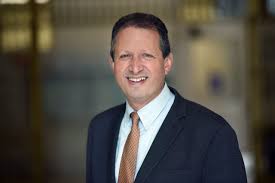January 21, 2014
By Steven Wishnia
“We’re a wall-to-wall union,” says United University Professions president Fred Kowal. “I can’t conceive of any other way. We represent everybody that does our work in SUNY. I think that’s the best way of ensuring political and labor strength.”
UUP, formed in 1973, represents more than 35,000 faculty and professional staff at the State University of New York’s campuses and medical schools.Kowal took over as president last June after 28 years as a professor of political science and Native American studies at SUNY’s college at Cobleskill.
The union’s top legislative priorities, he says, are saving SUNY Downstate Medical Center in Brooklyn, “maintaining the state’s commitment to public higher education, which has been eroding,” and winning “justice and a fair income and working conditions” for the system’s part-time and contingent workers, especially the adjunct professors who are about 30-40% of SUNY’s teaching staff.
Defending Downstate is “first and foremost,” Kowal says. The state has already closed parts of the Flatbush medical school/hospital complex and eliminated more than 500 jobs. UUP is part of a coalition of unions that has proposed shifting Downstate and three financially troubled Brooklyn hospitals—including Long Island College Hospital, which is costing SUNY $12-15 million a month—to concentrate on primary care, funded either by the state or a federal Medicaid-reimbursement waiver. This, he says, would ensure the delivery of primary care in Brooklyn, where many people depend on hospitals for it.
“Ours is the only long-term workable solution,” says Kowal. “We want it to remain public. That’s basically non-negotiable.”
The UUP also wants the state to create a $1 billion endowment fund for SUNY, which Kowal says would be a stable, long-term alternative to “fighting for nickels & dimes” in the legislature every year. To ensure that SUNY “resources aren’t lost to profiteers,” it’s keeping an eye on the system’s plans to begin “MOOCs” (massive open online courses) and on StartUp NY, Gov. Andrew Cuomo’s program to give ten-year tax exemptions to new businesses located on SUNY campuses.
A more recent issue is the state education department’s plans to evaluate student teachers based largely on a video taken in their second week of practice teaching, beginning this spring. The union objects that this is unfair—“when I was a TA, I wouldn’t have wanted to have been judged in my second week. I barely knew what I was doing,” says Kowal—and that the evaluations are going to be done by a for-profit company, Pearson, which will charge students for them.
“This is an assault on educator training,” says Kowal, and by extension, on public education and public-sector unions. UUP has gotten a lot of support from college administrators, he adds, and hopes to persuade state legislators to delay the program.
As UUP has strong health benefits in its contract, Kowal says, the Affordable Care Act’s only effect so far has been positive, because it eliminates copayments for routine procedures such as colonoscopies and physicals. But because “our plan is defined as one of the ‘Cadillac plans,’” it will likely face taxes in 2017.
The biggest challenges he’s facing as president, he adds, are winning public support and getting grass-roots member to be more active. “We’re working really hard at re-energizing the union. We need to be a bigger player in state and national politics and in a progressive movement,” he says. “We’re way behind, because the right has seized the agenda, and even our allies in the Democratic party are few and far between.”



